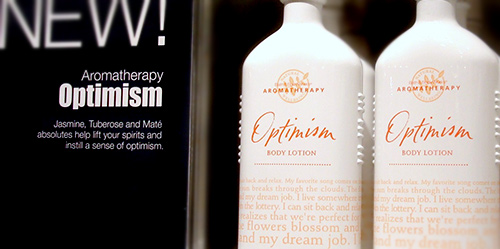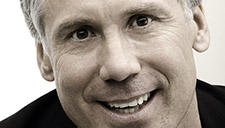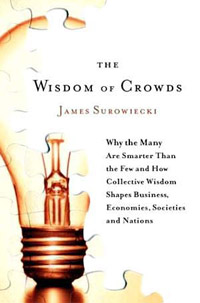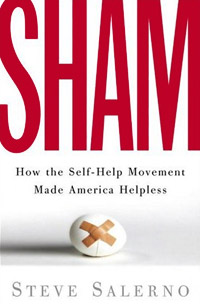Positively Non-Skeptical?
In our latest issue of Skeptic magazine (Vol. 14, No. 4), we published a skeptical analysis of the self-esteem and positive-thinking movement by investigative journalist Steve Salerno (which also appeared this eSkeptic), demonstrating that it is not enough to just say positive things, you actually have to do positive things. In response, Mark Robert Waldman and Andrew Newberg have written the following critique of Salerno’s critique, arguing that there is evidence for how thoughts influence actions. Be sure to read Steve Salerno’s response to this critique.
Andrew Newberg, MD, and Mark Waldman are authors of How God Changes Your Brain, Why We Believe What We Believe, and Born to Believe. Their research has been published in dozens of peer-reviewed journals and academic texts.
Steve Salerno is the author of SHAM: How the Self-Help Movement Made America Helpless.
Optimism is Good for Your Brain
by Mark Robert Waldman & Andrew Newberg, MD

detail of photo by Robert Banh, used under Creative Commons license (Attrib. 2.0 Generic)
As skeptical researchers with a penchant for thorough and accurate assessments of the strengths and weaknesses of positive thinking and optimism, we are dismayed by Salerno’s apparent lack of comprehension (and exclusion of references to back up his claims) when it comes to the hundreds of studies relating to this important psychological and neurological topic. A brief analysis of the 97 abstracts that are cited if you enter “positive thinking” (let alone the 3553 references to its companion term, optimism) as a key word in the databases of the National Library of Medicine and the National Institutes of Health (www.pubmed.gov) will demonstrate that Salerno has not done his homework.
Hope, optimism, and the belief in a positive future (i.e., faith) is essential for human psychological and neurological functioning, a concept that was first addressed in the 1950s by the psychiatrist Vicktor Frankl, who was imprisoned in a Nazi death camp until the end of World War II. In his famous book, Man’s Search for Meaning, he said that the single most important thing that kept a survivor alive was faith. If a prisoner lost faith in the future, he was doomed, because the will to live seldom returned. For Frankl, faith was essential for dealing with all aspects of life: “A weak faith is weakened by predicament and catastrophes whereas a strong faith is strengthened by them.”1
item of interest…
A 16-page booklet designed to hone your critical thinking skills. Includes suggestions on questions to ask, traps to avoid, examples of how the scientific method is used to test pseudoscientific and paranormal claims, and a how-to guide for developing a class in critical thinking. ORDER the book
Now, faith in an optimistic future may be a placebo, but it’s important to remember that placebos can cure, on the average, 30% of the majority of physical and emotional diseases. Even an irrational belief in a cure that has been proven not to work can significantly boost the body’s immune system when dealing with a deadly disease.2
But what about unrealistic faith or optimism? Recently, a team of National Institutes of Health researchers concluded that “a moderate optimistic illusion” appears to be neurologically essential for maintaining motivation and good mental health.3 They also found that highly optimistic people had greater activation in the same parts of the anterior cingulated, a part of the brain that plays a crucial role in controlling anxiety, depression, and rage, as well as fostering social awareness and compassion.4
Even the medical researchers at the Mayo Clinic stress the importance of optimistic thinking for maintaining optimal health. They found that positive thinking decreases stress, helps you resist catching the common cold, reduces your risk of coronary artery disease, eases breathing if you have certain respiratory diseases, and improves your coping skills during hardships.5 An optimistic attitude specifically reduces the stress-eliciting cortisol levels in your body6, and many other studies have demonstrated how optimism improves behavioral coping in a variety of physical illnesses7, and in a forty year follow-up conducted at Duke University, optimists had increased longevity when compared to pessimistic individuals.8
As reported in the November 2007 issue of Nature, if the human brain did not have a bias toward optimism, we would be prone to increased anxiety and depression.9 However, anxious individuals have a more difficult time suppressing negative thoughts10, and often get caught up in the repetitive process of rumination. This, unfortunately, strengthens the neural circuits that are generating anxiety and embedding the information into long term memory banks.
Optimism is also related to the neurological mechanism known as the placebo effect. If you strongly believe in something — in other words, if you have enough faith in your self — you will stimulate both your immune system and your motivational system into action.11
Skeptics might argue that maintaining an illusory optimism is problematic, but the evidence points in the opposite direction. Researchers at the University of California found that people who have self-enhancing illusions exhibit lower cardiovascular responses to stress, more rapid cardiovascular recovery, and lower baseline cortisol levels.12 In fact, an unrealistically optimistic belief about the future appears to be health protective, even when dealing with a disease as serious as AIDS.13 And in an article just published in March, 2009 issue of Behavioral Cognitive Psychotherapy14, researchers expected to find qualities of unrealistic optimism in patients with obsessive compulsive disorder. Instead they found the opposite, and thus the lack of positive thinking contributed to their overestimation of perceived threats in the world.
item of interest…
The exciting and counter-intuitive idea that a diverse, independent group will usually come up with better answers than a single expert. Brilliantly explained and flawlessly supported. ORDER the book
In another study, optimism added months, and even years to patients suffering from diabetes mellitus, rheumatoid arthritis, and multiple sclerosis.15 It will even increase your resistance to common colds and flu viruses, but it also bias you toward under-estimating the severity of your symptoms.16 Other studies, however, have pointed out that unrealistic optimism adds a decreased perception of risk.17 Optimism does cause people to underestimate their risk of getting divorced and to overestimate their prospects for success in the marketplace, and these are important implications to consider, especially when it comes to health-related concerns. For example, optimistic smokers underestimate their chances of getting ill.18 So the question we must face is this: Are we using our optimistic beliefs to maintain a destructive behavior or belief? If so, then a healthy dollop of reality-testing should be added to your recipe for health.
Optimism is also associated with a less realistic view of the world.19 But then again, so is pessimism.20
Pessimism, however, has few benefits, and it leaves the person more at risk to depression, anxiety, sleeping problems, obsessive-compulsive behavior, and impaired social functioning.21 In a thirty year longitudinal study conducted by the Mayo Clinic, pessimism was significantly associated with a shorter life-span and poorer mental functioning.22
Andrew Newberg, MD, and Mark Waldman are authors of How God Changes Your Brain, Why We Believe What We Believe, and Born to Believe. Their research has been published in dozens of peer-reviewed journals and academic texts.
READ Steve Salerno’s response below.
References
- ^ Frankl V. Man’s Search for Meaning. Washington Square Press, 1959.
- ^ See Newberg and Waldman, Born to Believe, for an in-depth look at the placebo effect and the power that beliefs have on physiological health.
- ^ Sharot T, Riccardi AM, Raio CM, Phelps EA. Neural mechanisms mediating optimism bias. Nature. 2007 Nov 1;450(7166):102–5.
- ^ Newberg and Waldman, How God Changes Your Brain. Ballantine, 2009.
-
^ www.mayoclinic.com/health/positive-thinking/SR00009
Kung S, Rummans TA, Colligan RC, Clark MM, Sloan JA, Novotny PJ, Huntington JL. Association of optimism-pessimism with quality of life in patients with head and neck and thyroid cancers. Mayo Clin Proc. 2006 Dec;81(12):1545–52.
-
^ Evans P, Forte D, Jacobs C, Fredhoi C, Aitchison E, Hucklebridge F, Clow A. Cortisol secretory activity in older people in relation to positive and negative well-being. Psychoneuroendocrinology. 2007 Sep-Nov;32(8-10):922–30.
Schlotz W, Schulz P, Hellhammer J, Stone AA, Hellhammer DH. Trait anxiety moderates the impact of performance pressure on salivary cortisol in everyday life. Psychoneuroendocrinology. 2006 May;31(4):459–72.
Lai JC, Evans PD, Ng SH, Chong AM, Siu OT, Chan CL, Ho SM, Ho RT, Chan P, Chan CC.Optimism, positive affectivity, and salivary cortisol. Br J Health Psychol. 2005 Nov;10(Pt 4):467–84.
-
^ Treharne GJ, Lyons AC, Booth DA, Kitas GD. Psychological well-being across 1 year with rheumatoid arthritis: coping resources as buffers of perceived stress. Br J Health Psychol. 2007 Sep;12(Pt 3):323–45.
Steptoe A, Marmo M, Wardle J. Positive affect and psychosocial processes related to health.Br J Psychol. 2007 Jun 27.
Martínez-Correa A, Reyes del Paso GA, García-León A, González-Jareño MI. [Relationship between dispositional optimism/pessimism and stress coping strategies] Psicothema. 2006 Feb;18(1):66–72.
Nes LS, Segerstrom SC. Dispositional optimism and coping: a meta-analytic review. Pers Soc Psychol Rev. 2006;10(3):235–51.
Schou I, Ekeberg Ø, Ruland CM. The mediating role of appraisal and coping in the relationship between optimism-pessimism and quality of life. Psychooncology. 2005 Sep;14(9):718–27.
- ^ Brummett BH, Helms MJ, Dahlstrom WG, Siegler IC. Prediction of all-cause mortality by the Minnesota Multiphasic Personality Inventory Optimism-Pessimism Scale scores: study of a college sample during a 40-year follow-up period. Mayo Clin Proc. 2006 Dec;81(12):1541–4.
- ^ Sharot T, Riccardi AM, Raio CM, Phelps EA. Neural mechanisms mediating optimism bias. Nature. 2007 Nov 1;450(7166):102–5.
- ^ Gillath O, Bunge SA, Shaver PR, Wendelken C, Mikulincer M. Attachment-style differences in the ability to suppress negative thoughts: exploring the neural correlates. Neuroimage. 2005 Dec;28(4):835–47.
- ^ Furukawa TA, Watanabe N, Omori IM, Churchill R. Can pill placebo augment cognitive-behavior therapy for panic disorder? BMC Psychiatry. 2007 Dec 20;7:73. See also: Harrington, A. (Ed.) The Placebo Effect. Harvard University Press, 1999.
- ^ Taylor SE, Lerner JS, Sherman DK, Sage RM, McDowell NK. Are self-enhancing cognitions associated with healthy or unhealthy biological profiles? J Pers Soc Psychol. 2003 Oct;85(4):605–15.
- ^ Taylor SE, Kemeny ME, Reed GM, Bower JE, Gruenewald TL. Psychological resources, positive illusions, and health. Am Psychol. 2000 Jan;55(1):99–109.
- ^ Inversion of the “unrealistic optimism” bias contributes to overestimation of threat in obsessive-compulsive disorder. Moritz S, Jelinek L. Behav Cogn Psychother. 2009 Mar;37(2):179–93.
- ^ Fournier M, De Ridder D, Bensing J. Optimism and adaptation to chronic disease: The role of optimism in relation to self-care options of type 1 diabetes mellitus, rheumatoid arthritis and multiple sclerosis. Br J Health Psychol. 2002 Nov;7(Part 4):409–432.
- ^ Cohen S, Alper CM, Doyle WJ, Treanor JJ, Turner RB. Positive emotional style predicts resistance to illness after experimental exposure to rhinovirus or influenza a virus. Psychosom Med. 2006 Nov-Dec;68(6):809–15.
- ^ Weinstein ND. Unrealistic optimism about susceptibility to health problems. J Behav Med. 1982 Dec;5(4):441–60.
- ^ Dillard AJ, McCaul KD, Klein WM. Unrealistic optimism in smokers: implications for smoking myth endorsement and self-protective motivation. J Health Commun. 2006;11 Suppl 1:93–102.
- ^ Groot W, van den Brink HM. Optimism, pessimism and the compensating income variation of cardiovascular disease: a two-tiered quality of life stochastic frontier model. Soc Sci Med. 2007 Oct;65(7):1479–89.
- ^ Weber H, Vollmann M, Renner B. The spirited, the observant, and the disheartened: social concepts of optimism, realism, and pessimism. J Pers. 2007 Feb;75(1):169–97.
-
^ van der Velden PG, Kleber RJ, Fournier M, Grievink L, Drogendijk A, Gersons BP. The association between dispositional optimism and mental health problems among disaster victims and a comparison group: A prospective study. J Affect Disord. 2007 Sep;102(1–3):35–45.
Pinquart M, Fröhlich C, Silbereisen RK. Optimism, pessimism, and change of psychological well-being in cancer patients. Psychol Health Med. 2007 Aug;12(4):421–32.
-
^ Maruta T, Colligan RC, Malinchoc M, Offord KP.Optimists vs pessimists: survival rate among medical patients over a 30-year period. Mayo Clin Proc. 2000 Feb;75(2):140-3. Erratum in: Mayo Clin Proc 2000 Mar;75(3):318.
Maruta T, Colligan RC, Malinchoc M, Offord KP. Optimism-pessimism assessed in the 1960s and self-reported health status 30 years later. Mayo Clin Proc. 2002 Aug;77(8):748–53.
Salerno’s Response
Sometimes when I receive criticism I’m left wondering: Did they actually read the piece? This is such a case.
For the record, I have never argued that optimism has no legitimate role in life. I argue that the frenzied overselling of optimism as a blanket prescription for all that ails us is one of the more subtly destructive forces in American culture. Just as scholastic self-esteem gurus were dead-wrong when they led us to believe that so-called “bolt-on” self-esteem automatically yields academic excellence, there’s no question that today’s gurus of optimism have led the nation down the primrose path in declaring that an upbeat attitude is its own foolproof reward. My real quibble, then, is with undue optimism about optimism — “the notion that the riddle of success is more easily solved by attitude than aptitude,” as I wrote near the top of the story. I was primarily indicting the commodification of optimism, and I stand by that assessment. (The gurus are right about one thing, however. Optimism does produce a great deal of wealth: their own.)
item of interest…
Are you addicted to self-help books? Do you require “empowerment” to reverse your “victimhood”? If so, relax — you’re far from alone. The Self-Help and Actualization Movement (the titular SHAM) is, according to Salerno, an $8-billion-a-year industry that depends on legions of repeat customers. ORDER the book
Authors Waldman and Newberg, meanwhile, offer us an object lesson in how a few scraps of “emerging science,” as it’s called in those smarmy TV ads for dubious new health-care products, become conventional wisdom. They write, for example, that “medical researchers at the Mayo Clinic stress the importance of optimistic thinking for maintaining optimal health. They found that positive thinking decreases stress, helps you resist catching the common cold, reduces your risk of coronary artery disease, eases breathing if you have certain respiratory diseases, and improves your coping skills during hardships.” That’s one seriously overstated mouthful, because the Mayo researchers “found” no such thing; if you go to the Mayo site, you’ll see that they speculate that positive thinking may pay these dividends … and even those tentative declarations are made based on “some” (cherry-picked?) studies. Not coincidentally, this is the same strategy elevated to an art form by the National Center for Complementary and Alternative Medicine in touting its pet nostrums.
The authors also rely on the common ploy of argument-by-poetry, framing philosophy as truth. This is most clear in the several quotes from Victor Frankl. Much like the transcendent line, “All men are created equal,” the Frankl quotes sound terrific but enjoy no scientific standing.
As for the charge that I haven’t done my homework: Although my piece may not be annotated in strict academic style, I wonder how the authors overlooked the references to the work of Roy Baumeister, Charles Elliott, Charles Sykes, Jean Twenge, etc. — people who clearly have done their homework. But that’s not even the main point. Cleverly, the authors have embraced another staple New Age tactic by inverting the scientific method: telling me it’s my job to prove that optimism is ineffective, when in fact it’s their job, as members of the movement making all these claims, to conclusively demonstrate the efficacy of optimism, hope, PMA, etc.
We still have no way of knowing whether optimistic people actually do better at life or whether they just feel better about the same old crappy life (and therefore are less motivated to change anything). Do they end up like those American students, steeped in self-esteem, who got the worst grades in international testing but had the highest subjective self-assessments?
item of interest…
Sociologist Joel Best dissects the dangerous hula hoops of business, medicine, science and education in this exposition on institutional fads. According to Best, American attitudes toward progress (colored by optimism, competitiveness, a belief in positive change and a fear of being seen as old-fashioned) serve as kindling to the fire of the next big cure, technological revolution, business management secret or teaching method…
ORDER the book
To paraphrase the famous line from the movie, “Show us the money.”
Overall, the authors represent a blended (and, as I see it, disingenuous) “compromise” between science and spirituality that, on closer inspection, necessarily calls for throwing science out the window. Waldman and Newberg are authors of a new book, How God Changes Your Brain, whose very premise and central concept — God — cannot, by their own admission, be proved. In their book, Waldman and Newberg write, “Having an accurate perception of reality is not one of the brain’s strong points.” And: “The human brain seems to have difficulty separating fantasies from facts.” Fair enough … but is that where a true scientist should leave things? Do we then embrace the fantasies? Isn’t it the scientist’s job to weed out the real from the unreal; to wean people off the unreal; and to encourage people to work within the realm of the real, even if reality is less comfortable than fantasy? Otherwise what is the purpose of skepticism to begin with?
One final point. What I find amusing about the so-called “studies” of the role of mental outlook in health care is this: If a positive attitude is so decisive in health-care outcomes, then why not do a real controlled study wherein the control group tries to heal itself through PMA alone? Say, let’s have two groups of grievously ill heart patients, both with 95 percent blockage of the coronary arteries. Group 1 undergoes heart bypass plus blood thinners, etc. Group 2 forgoes all medical intervention and tries to get better just by visualizing the unclogging of their arteries. (If you like, we can even compose Group 1 from a bunch of pessimistic curmudgeons.)
Report back and tell me how it goes.
upcoming lectures at Caltech…

Thank God for Evolution
with Michael Dowd
Sunday, June 7, 2009 at 2:00 pm
Baxter Lecture Hall (map)
The Reverend Michael Dowd is one of the most inspiring speakers in America today. His lecture/sermon is based on his bestselling book, Thank God for Evolution: How the Marriage of Science and Religion Will Transform Your Life and Our World, which has been endorsed by 5 Nobel Prize-winning scientists and dozens of other scientific and religious luminaries across the spectrum. Since April 2002, he and his wife, Connie Barlow, an acclaimed science writer, have lived permanently on the road sharing a sacred view of evolution with religious and secular audiences of all ages, as America’s evolutionary evangelists…
READ more about this lecture >
READ about our other upcoming lectures >

The Evolution of God
with Robert Wright
SPECIAL DAY AND TIME:
Thurs., June 11, 2009 at 7:00 pm
Baxter Lecture Hall (map)
In this sweeping story that takes us from the Stone Age to the Information Age, bestselling author Robert Wright unveils an astonishing discovery: there is a hidden pattern that the great monotheistic faiths have followed as they have evolved. Through the prisms of archaeology, theology, and evolutionary psychology, Wright’s findings overturn basic assumptions about Judaism, Christianity, and Islam, and are sure to cause controversy…

Atheists & Genesis Revisited Hits the Small Screen
In this week’s SkepticBlog, Michael Shermer shares two videos. The first is from the ABC Australia TV series Compass; Shermer was interviewed for a show called “The Atheists” while he was in Sydney last summer. The second is based on the Coda from his book, Why Darwin Matters entitled “Genesis Revisited.” The voice in the video is a computer generated voice called “Daniel” from RealSpeak.
READ the post
and comment on it at Skepticblog.org >
While you’re there be sure to read the blog posts of the other Skepticbloggers: Brian Dunning, Kirsten Sanford, Mark Edward, Phil Plait, Ryan Johnson, Steven Novella, and Yau-Man Chan.















